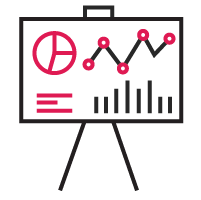Overview - Bringing A 100 Year Old Oil Company Up to Speed With Agile With…
Case Study
A Lean-Agile Practice Accelerates Progress in this Luxury Auto Maker’s EV Production Facility
Company Details
Industry: Automotive manufacturing
Company Size: Over 44,000 employees worldwide
Location: UK (with facilities worldwide)
Products: Luxury cars, trucks, and SUVs
Cprime Services:
Executive Summary
This leading British car maker saw the need for faster time-to-market and smoother collaboration between UK and China teams as they pursued their new electric vehicle project. After facing disappointing results with an initial vendor, the luxury car leader reached out to Cprime for guidance building and scaling an Agile practice in their Shanghai manufacturing plant with stellar results.

The Challenge: The Need for Speed (to Market)
Many markets, representing millions of potential customers, have committed to banning the sale of gas-powered vehicles by 2035. Others have made voluntary arrangements to support the adoption of electric vehicles soon. This trend underscores the value and need for quick, efficient, and sustainable EV manufacturing—a challenge this company has proudly embraced.
Leadership committed to the electric vehicle project with a goal of opening production facilities in Shanghai, China. Seeing the need to get up and running quickly and ensure optimal collaboration between the Shanghai manufacturing teams and existing UK vehicle teams, establishing a solid Lean-Agile practice became a priority.
But there were some formidable challenges to overcome:
- Most members of the engineering and manufacturing teams in Shanghai were totally new to Agile, although familiar with Lean Manufacturing methods and concepts. So, they are learning a new way of working while simultaneously setting up new facilities, melding as a team, and taking on a new, high-priority project.
- Multinational distributed teams can face barriers because of language and cultural differences, as well as the logistical issues caused by widely spaced time zones—there is only a three-hour window when teams in the UK and China are both working.
The company originally brought in an Agile Transformation vendor that failed to mesh effectively with the teams and didn’t make genuine progress. To reset the initiative, they brought in Cprime… and we have guided the Shanghai teams to perform “Above and Beyond” expectations.
The Solution: Expert Training and Coaching that Guides New Agile Teams to Scaled Success
Cprime Agile Coaches began working with the Shanghai teams in coordination with the company’s Lead Agile Coach in London. Success was a multi-step process.
Initial Planning

Rather than attempting to take on everything at once, the plan was to start with a team of seven coaches working with about 60 team members. As the engagement progressed beyond the fundamentals, Cprime brought in two additional coaches to meet the program’s needs over the next three months. The teams were further organized into nineteen “squads” across three coaching groups as internal roles matured.
Filling Necessary Agile Roles
At the start, the Cprime Agile Coaches took on the responsibilities of Scrum Master for the teams, besides coaching and training. Donald has worked closely with the client team to facilitate the hiring and training processes so internal associates could fill those roles as quickly as possible.
Now, all the teams’ Scrum Masters and Product Owners are well-qualified internal team members and the Cprime coaches can focus wholly on coaching and training the teams for success. The three coaching groups now comprise two or three Cprime coaches, six internal Product Owners, and three Scrum Masters from six different squads.
Agile Training
To ground the Shanghai teams in the fundamentals of Agile and how to apply them in the manufacturing environment, the coaches facilitated several training courses over four months. These included:
- Twelve core module courses covering three topics (Agile Mindset, Introduction to Scrum, and the client’s unique framework for scaling Agility)
- Fifteen bite-size learning sessions on various topics developed to fill specific gaps, including Jira and Confluence fundamentals, Innovations Stories Sharing, and Kanban fundamentals.
- Seven role-based sessions to train and support new Scrum Masters and Product Owners.
Additionally, a Leadership Training program is slated to begin to broaden organizational support for the growing Agile practice.
Ongoing Stabilization and Scaling
As the Agile practice develops and scales, stabilization is required to ensure the organization maintains continuous improvement and reaps all the benefits of Agility. The core stabilizing factor is the Agile Community of Practice (CoP).
CoPs are groups of people organized around a specific technical or business domain. A healthy CoP actively focuses on professional networking, personal relationships, shared knowledge, and common skills, forming a strong and welcoming culture within the represented teams. As a result, knowledge workers enjoy autonomy, mastery, and purpose beyond their daily tasks.
In collaboration with the Scrum Masters, Cprime coaches have organized a strong and growing Agile Community of Practice supporting the Shanghai and UK teams’ ongoing stabilization.
The Results: Burgeoning Agile Maturity, Continuous Improvement, and Delighted Teams
By the end of November, the teams had worked together through eight sprints, each an improvement over the last. This trend of continuous improvement will continue and even accelerate as the new Agile leaders mature and the Cprime coaches are now free to focus only on coaching and development.
Excellent Net Promoter Scores (NPS) Following Training
Prior to Cprime’s involvement, the client had no formal process in place for measuring the efficacy and value of training and development. By introducing the NPS process, the coaches could measure the value of the Agile training programs they facilitated so that these, too, could continuously improve.
An NPS can range from -100 (very poor) to 100 (essentially perfect). The average NPSs for Cprime-led training courses in Shanghai were:
- 72.7 on the twelve core module courses
- 70.9 on the 15 bite-size sessions
- 74.3 on the seven role-based course
Delighted Team Members

- “The coaches encourage the teams and organize our meetings very well.”
- “They work very hard to help the teams.”
- “The Agile coaches are very good to new employees. They guide us through the projects, helping us understand the detailed background, and solving any problems or questions that come up along the way.”
- “Team meetings are held efficiently within a timebox, and we are avoiding unnecessary meetings.”
- “The coaches have strong professional knowledge and are proactive in communicating with other groups, and escalating issues when necessary.”
The Shanghai teams are poised for continued growth and acceleration. With continued support from Cprime Agile Coaches and In collaboration with the Agile teams at the group level in the UK, we foresee ongoing success.

